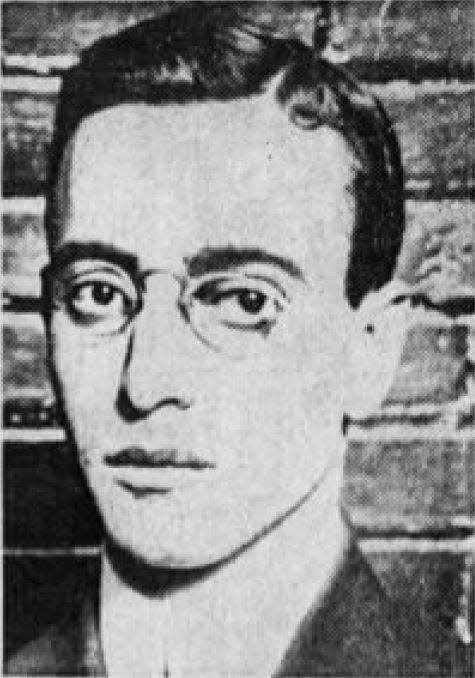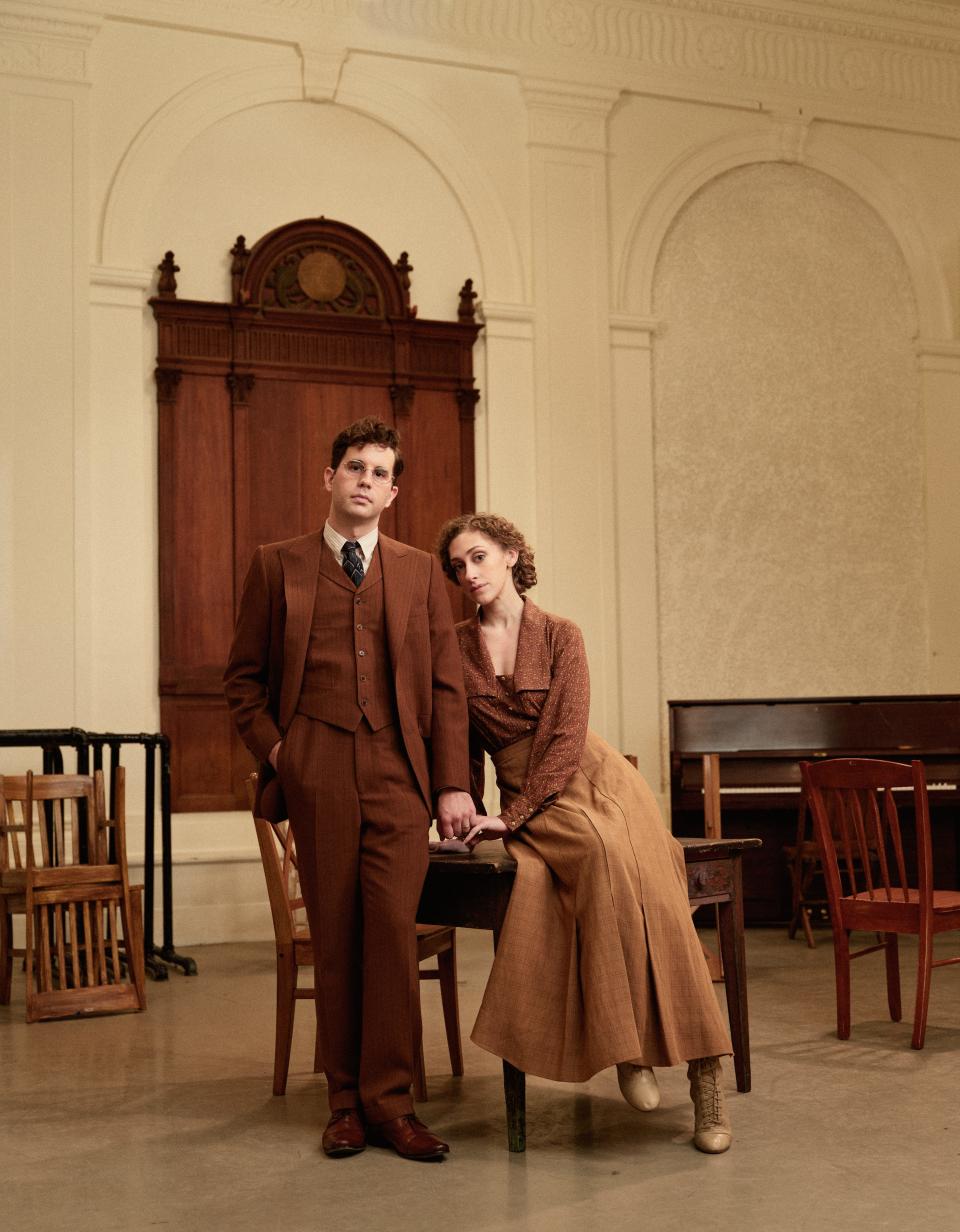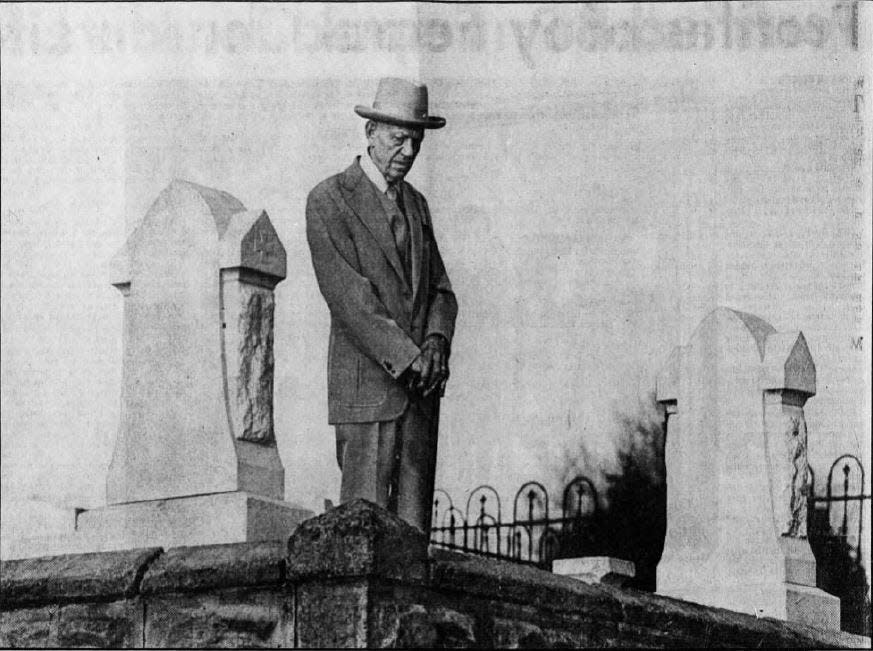Neo-Nazis came to Broadway to protest 'Parade.' All the more reason for the show to go on.
- Oops!Something went wrong.Please try again later.
- Oops!Something went wrong.Please try again later.
There were neo-Nazis on Broadway last week.
The night of the first preview of the new Broadway production of "Parade," audience members waiting to enter the Bernard B. Jacobs Theater were harangued by members of a far-right white supremacist group, The National Socialist Movement.
"Parade" tells the story of Leo Frank, the Jewish superintendent of a pencil factory in Atlanta, who in 1913 was falsely accused and wrongfully convicted of the murder of 13-year-old Mary Phagan. It is a signal event in the history of antisemitism and white supremacist terrorism in this country, and the case was behind both the creation of the Anti-Defamation League and the resurgence of the Ku Klux Klan.
Since 'Parade' opened in the late '90s
There is a website about the Leo Frank case that is not hard to find on Google. It has been around in some form or other since we first opened "Parade" in the late 1990s, and perhaps even before then. It’s quite extensive and you might even think it was a legitimate research archive if you didn’t dig too deep.
Opinions in your inbox: Get exclusive access to our columnists and the best of our columns
But then you’ll run across something like this article from Oct. 28, 2019, written by the site’s curator, N. Joseph Potts: “Jewish Men Dying In Jail For Ravaging Young Girls: (Jeffrey) Epstein v (Leo) Frank.”
And suddenly there you are, deep in the world of antisemitic conspiracy theory and fearmongering that has followed Jews around since Ptolemy ruled ancient Egypt.

When Jews first encounter this stuff at a young age, our instinct – well, let me not generalize – my instinct was to laugh; surely no one believed this. We had horns? We baked matzah with the blood of Christian children? We secretly ran the world’s banking systems? Madness, obviously.
As I got older, I developed a wary familiarity with the nonsense. It didn’t seem to affect my life too much, but it was always there, this persistent mockery and hostility that seemed so ridiculous on the surface but was continually being given little infusions of oxygen.
Oxygen giving antisemitism new life
You don’t need me to tell you that it’s all been getting a whole lot more oxygen recently. Correlation might not equal causation, but the Jew haters have certainly gotten noisier and bolder since Donald Trump’s election. You know that. I know that. They know that. Let’s not be coy.
'I don't know how we survived': A new generation of the antisemitism we thought was behind us
Fear, hate and ignorance live in darkness: On Hanukkah, the 9th candle reflects how anyone can fight antisemitism by sharing truth
It’s not that "Parade" hasn’t been on their radar before. Mary Phagan’s grandniece, Mary Phagan-Kean, has been loudly denouncing Leo Frank and our show since we opened at Lincoln Center and has been duly embraced and amplified by antisemitic groups.
There was a certain degree of hubbub when we opened our tour in Atlanta in 2000; and there are many websites (including the one I mentioned above) that include "Parade" in their list of sins against the good white people of Georgia and America, but by and large, to be honest, the show itself hasn’t had a large impact on the general public, so it hasn’t drawn out the crazies as much as it would have had it been, say, "Hamilton."

But before we had our gala presentation at New York City Center last fall, our producer, Jenny Gersten, called me to ask whether there had been a history of threats against the show. I didn’t need to ask why she was calling. I took a deep breath. Ah, I thought. That’s where we are now.
I feel terrible that audience members waiting in line to see our show on Broadway may be accosted by neo-Nazis. (I can’t believe I’m writing that sentence.) But I'll tell you the truth: I’m glad the thugs showed up. I’m glad they feel threatened enough to emerge into the light and show their faces. They are what "Parade" is about.
'An Innocent Man Was Lynched': Reporting exonerated Leo Frank in the murder of Mary Phagan
I suspect they don’t particularly know or care about the case; they just want to yell out the words “Jew” and “pedophile.” They won’t really engage with you, they can’t; everything they could tell you about Leo Frank and the case has been decisively debunked, over and over again.
No legitimate conversation about the murder of Mary Phagan will end with you believing Leo Frank was guilty.

What Leo Frank's case mirrors in our America today
There is plenty of research, much more than there was when Alfred Uhry and I started work on this show, which details in stark clarity the myriad ways in which Leo Frank was targeted and attacked by a society that did not care about the evidence or the law.
The wounded, frightened populace of Atlanta wanted a Jew punished, and in the same way that some people will tell you that there was fraud in our last election no matter how much you show them that there wasn’t, the people of Georgia in 1913 believed that a Jew killed that girl no matter how much you proved that he couldn’t have. Some of them still do.
Opinion alerts: Get columns from your favorite columnists + expert analysis on top issues, delivered straight to your device through the USA TODAY app. Don't have the app? Download it for free from your app store.
The evidence presented at trial and collected over the past 110 years suggest pretty clearly that Leo Frank was a difficult man to like. He was no hero. He was no martyr. But one of the things "Parade" says is that you don’t have to praise or admire Leo Frank to see that he was the victim of a gross miscarriage of justice, fueled by rage and fear and antisemitic hysteria.
For the past couple of months, lots of people have been saying to me how important it is that we’re bringing "Parade" to Broadway right now, how the world needs to see this story at this moment in time. Honestly, I’ve been kind of skeptical; the story’s been there all along.
But I have to acknowledge in light of last week’s events that there’s something about Ben Platt, a Jewish star, leading this American story about prejudice and scapegoating, right there in our weird little corner of the national cultural conversation, that really counts. Clearly it affects our audience. Obviously it’s affecting the other side as well.
The conversation was brought right to the stage door last week. That’s where we are now.
Jason Robert Brown is a Tony Award-winning American musical theatre composer, lyricist and playwright. He is the composer and lyricist of "Parade."
You can read diverse opinions from our Board of Contributors and other writers on the Opinion front page, on Twitter @usatodayopinion and in our daily Opinion newsletter. To respond to a column, submit a comment to letters@usatoday.com.
This article originally appeared on USA TODAY: Neo-Nazis protest Broadway musical 'Parade.' That's where we are now

